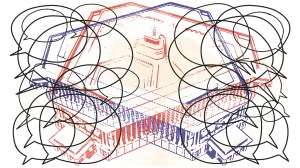Pro-EU protesters tear down Lenin statue in Kiev
The accords were also viewed as a way to break free of the grip of Russia.
DAVID M HERSZENHORN amp; ANDREW E KRAMER
KIEV
In the biggest demonstration yet after weeks of growing momentum,hundreds of thousands of Ukrainians on Sunday filled Kievs streets,tearing down and then crushing a monument to Vladimir Lenin in the city center and intensifying their outcry over President Viktor F Yanukovichs turn away from Europe.
Carrying blue-and-yellow Ukrainian and European Union flags,the teeming crowd here filled Independence Square,which has been transformed by a vast and growing tent encampment,and where demonstrators have occupied public buildings,including City Hall.
Resignation! Resignation! members of the crowd chanted,reiterating their call for the ouster of Yanukovich and the government led by Prime Minister Mykola Azarov. Thousands more people gathered in other cities across the country. The giant rally reflected just how deeply roiled this nation of 46 million people has become in the weeks since Yanukovich said he would not complete political and free-trade agreements with the European Union that he had been promising to sign for more than a year.
With Western governments urging a peaceful and lawful solution,but no indication of any possibility of a compromise,the continuing unrest seemed likely to confront Yanukovich with several unpalatable choices,including a crackdown by security officers that many demonstrators say they fear but believe was inevitable.
The president could wait,hoping that increasingly cold weather and demoralisation will eventually thin the crowds,but the continuing occupation of a large swathe of the capital has already added a patina of weakness and indecision to the governments growing unpopularity.
Heightening the tension is a severe and urgent economic crisis,along with Ukraines need to secure a financial aid package worth 18 billion or more. At the moment,that help seems most likely to come from Russia,but any agreement with the Kremlin is likely to spur further public fury.
Many Ukrainians view the accords with the European Union as crucial to a brighter future,with Western-style rule of law that could combat what many view as deeply entrenched public corruption and cronyism among the countrys wealthy elite. They also see the agreements as eventually offering better economic opportunities.
The accords were also viewed as a way to break free of the grip of Russia,which nearly a quarter-century after the collapse of the Soviet Union continues to exert heavy sway here.
- 01
- 02
- 03
- 04
- 05































